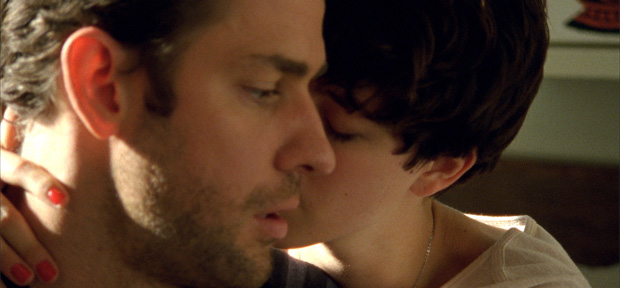Ry Russo-Young’s third feature explores the warring states of isolation and proximity in Los Angeles, sometimes keeping the audience at arm’s length with its intimacy.
Director: Ry Russo-Young
Writer(s): Lena Dunham, Ry Russo-Young
Runtime: 83 minutes
Starring: John Krasinski, Olivia Thirlby, Rosemarie Dewitt, India Ennega
Festival: Sundance London
Country: US
Rating (?): Better Than Average Bear
Ry Russo-Young‘s debut film, Orphans (2007) won a Special Jury Prize at South by Southwest upon its release, immediately grabbing audiences with her vision. Her sophomore effort, You Won’t Miss Me (2009), appeared at the Sundance Film Festival, and went on to win a Gotham Award for Best Film Not Playing at a Theater Near You. Her third film, co-written with Lena Dunham (Tiny Furniture, HBO’s Girls), continues her exploration of the intimacies of human relationships in this often funny, and sometimes cold, dissection of the complexities of modern relationships.
23-year-old Martine (Olivia Thirlby) arrives in the hip hills of Los Angeles to stay in the poolhouse of sound designer Peter (John Krasinski) and his wife Julie (Rosemarie Dewitt). There to work on her short film about insects, her presence sparks something in all three parties that not only shatter the idyllic lives of the couple, but bring to light the thin veneer that everybody holds up on the pretense of civility in the big city.
Thirlby’s Martine is an ambiguous seductress, never overtly portrayed as a consciously disruptive force, but rather she brings with her the scent of sex. It is suggested that she is using her sexuality to her own advantage, but all she merely does is open the door. It is further implied that Peter and Julie had already allowed it to be left ajar, and it is their willingness and desire to be seen as an open-minded couple fostered this environment. Few other wives would willingly allow an attractive young girl into their house to be locked in a tiny soundproof room for days with their husband, after all. An interesting parallel is the young daughter Kolt (India Ennega of TV’s Treme), who independently manages to make her feelings of disgust clear to her slimy older Italian teacher Marcello (Emanuele Secci).
Rapidly becoming a genre of its own, thanks partly to the pseudo-mainstream success of the likes of Sofia Coppola’s Lost in Translation and Somewhere, the slow-paced style of dramedy has carved out a niche as the artistic outlet of 20 and 30-something filmmakers, precariously perched inside an ironic voicelessness that comes from ubiquitous access to communication platforms. Like co-writer Dunham’s microcosmic view of New York’s Tribeca in Tiny Furniture, there is an element of parody to this portrait, but unlike that earlier work the writing duo have constructed a set of characters that are worth exploring. While this sometimes treads dangerously close to creating a void between he audience and the film, Russo-Young’s snapshot of a dysfunctional unit captures the reality of living in a big city.
Nobody Walks premiered at the Sundance Film Festival in January 2012, and screened again at the Sundance London Film Festival in April 2012. It has been picked up by Magnolia Pictures for US distribution.





